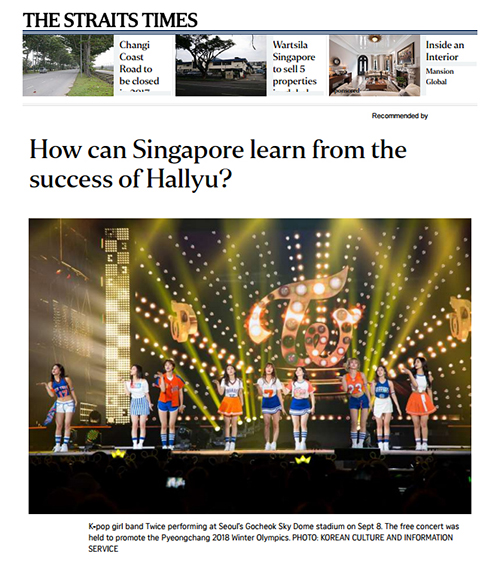-
 Korea.net's 24-hour YouTube channel
Korea.net's 24-hour YouTube channel- NEWS FOCUS
- ABOUT KOREA
- EVENTS
- RESOURCES
- GOVERNMENT
- ABOUT US

The wave of Korean media and music sweeping across East Asia and elsewhere is one of the key drivers of Korea's soft power, says Singaporean daily The Straits Times in its article 'How can Singapore learn from the success of Hallyu?' published on Sept. 26.
"Pop culture has worked a powerful magic in South Korea, turning it into one of the coolest places on the planet, which begs the question: How can Singapore get in on the act?"
The Straits Times began its article with that question in "How can Singapore learn from the success of Hallyu?" published on Sept. 26.
"The Hallyu fever, which started around 20 years ago, had overtaken Japanese pop that held sway from the 1980s to the early 1990s, and shows no sign of cooling," the Singaporean newspaper said. "While there are no official statistics on K-wave's impact on the South Korean economy," the newspaper said, "it probably contributes 3 to 5 per cent to the country's gross domestic product," quoting a CIMB Private Bank economist.
The newspaper said that, "The sustained appeal of Hallyu was no fluke and its success had to do with state support and concerted industry effort to stay ahead of the curve," mentioning the Korean government's support for the pop music, movie and TV industries.
Quoting Ernst & Young, the article said, "The South Korean government has invested around USD 5.2 billion or 1.4 per cent of its budget in culture and media, with the goal of increasing it to USD 7.8 billion, or 2 per cent of the budget, by next year." The paper noted that the government's plans to expand the number of Korean Cultural Centers and King Sejong Institute Korean language learning centers around the world are part of government investments in these industries.
The newspaper talked about the Cel Academy, a "training center for content creators," and said that it was one example to explain the way in which, "The South Koreans are still exploring new ideas to stay ahead." The paper said that the school "is adding new programmes on virtual reality and augmented reality next year to help students tap opportunities from 'digital convergence.'"
The article concluded by saying that, "While it may not be possible to fully replicate what the South Koreans have done, the success of Hallyu as a tool for expanding South Korea's soft power and cultural engagement with the world makes for an interesting case study."
By Chang Iou-chung
Korea.net Staff Writer
Photo: captured from The Straits Times online
icchang@korea.kr
Most popular
- First hearing-impaired K-pop act hopes for 'barrier-free world'
- Expats could account for 7% of population in 20 years: report
- 'Mad Max' director impressed by 'cinema-literate' Korean viewers
- Show in Italy to present 'thought-filled' Korean craftworks
- Romanian presidential couple visits national cemetery













